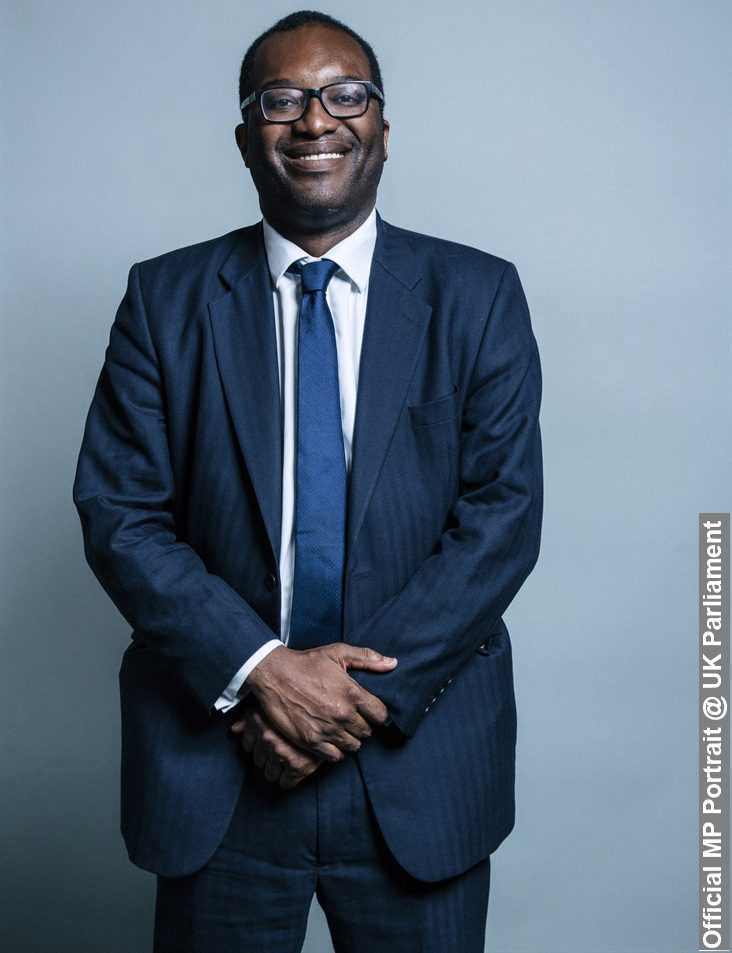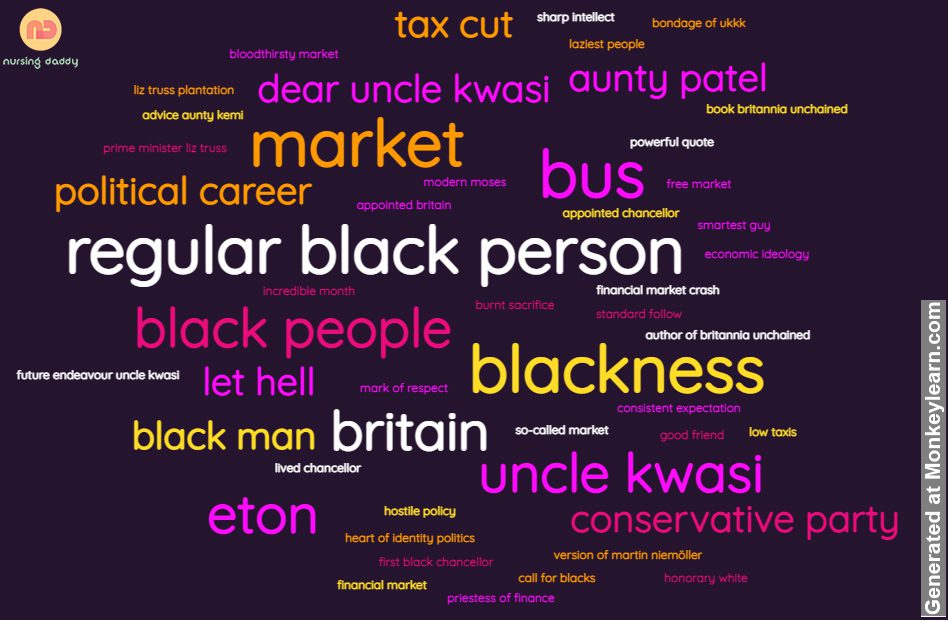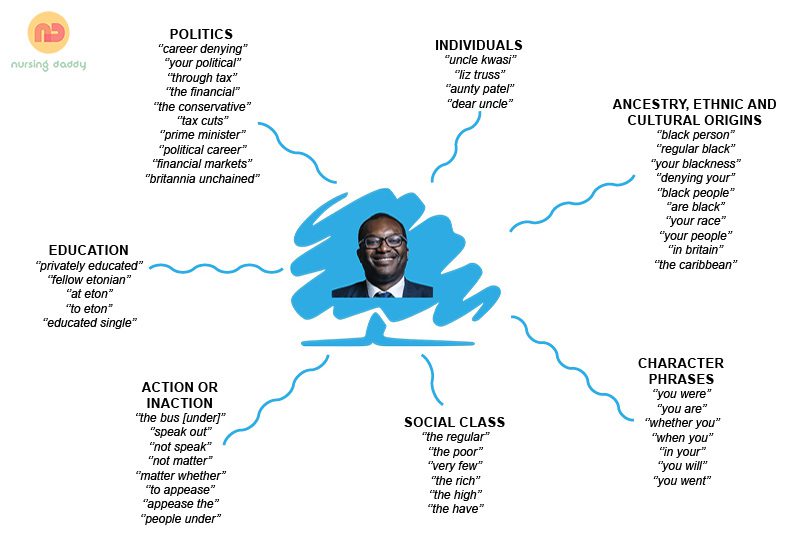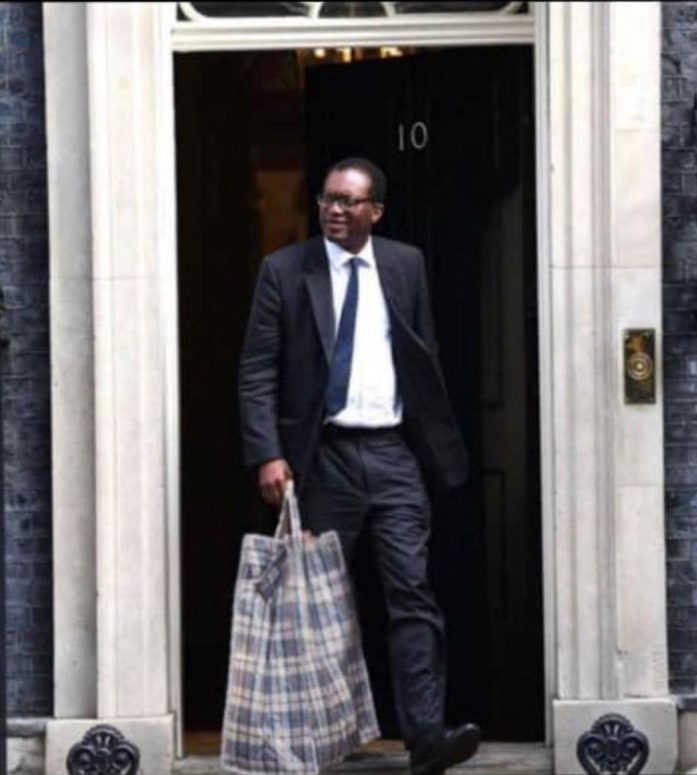I recognise that the title ‘Are Prominent Black Figures Responsible for Black: Kwasi Kwarteng’ is a contentious heading. However, this was precisely what I was trying to achieve. I have been disappointed by the coverage surrounding Kwasi Kwarteng. You cannot hold or have held high office in the UK without proper attention.
But when those with the same ancestral links kick you on your way down, questions must be asked. We are all entitled to freedom of speech and to express ourselves in any way we wish. The question remains to be answered, and this is a societal issue. Where should that imaginary boundary line be drawn?
Readers, I do not intend to influence your views. However, when a WhatsApp message landed in my inbox, I was genuinely disappointed with its content. It summoned an emotion within which I could not fully understand. Why would you kick a human on the way down? Or why would you hold an individual account for his lack of affection towards his race?

Who is Kwasi Kwarteng?
The Rt Hon Kwasi Kwarteng is the Conservative MP for Spelthorne and has been an MP continuously since 6 May 2010. Since I am a British Ghanaian, I will only serve the mother country well if I give you his full name.
Akwasi Addo Alfred Kwarteng was born in East London (like yours truly) in 1975 to Ghanaian parents who came to the UK from Ghana as students in the 1960s. He had a solid academic start with an economist father and a barrister mother.
He was privately educated at Eton College school after gaining a scholarship. Kwasi Kwarteng then went to Cambridge University and graduated with a double first in classics and history. After achieving the Kennedy Scholarship, he attended Harvard University in the United States for a year. He returned to Cambridge University to complete a PhD in economic history in 2000.
He is possibly the most stacked politician and, indeed, the Chancellor of the Exchequer. Subsequently, he worked as a columnist for the Daily Telegraph and a financial analyst at banks, including JP Morgan, in the City of London.
His interest in politics (Conservative) started when he got involved as chairman of the Bow Group think tank. His first attempt to become an MP in 2005 failed. This was followed by an unsuccessful bid for the London Assembly in 2008.
Kwasi Kwarteng’s lottery ticket would come in 2010 when he was elected as MP for Spelthorne in Surrey and entered Parliament. He campaigned for Leave in the 2016 Brexit referendum and, in 2017, became a ministerial aide to Philip Hammond. Soon after, he would earn his stripes as a junior minister in the Department for Exiting the European Union.
As a close ally of Boris Johnson, Kwasi Kwarteng as energy minister in 2019; some 18 months later, he became business secretary. The old boy’s network helped him with a reward for backing Boris Johnson during the race for party leadership.
Kwasi Kwarteng would become Chancellor of the Exchequer on 6 September 2022 under Liz Truss as Prime Minister of the United Kingdom. This would last only 38 days after the mini-budget he unveiled on 23 September spooked financial markets and prompted a pound price drop. He earned his marching orders on 14 October 2022 and became
the second shortest-serving Chancellor.It should be noted that this brilliant man has published multiple books and was part of the Cambridge team which won the University Challenge in 1995.
Regardless of his economics philosophy, I believe ethnic minorities should be proud of what he has achieved. The old guard and impenetrable glass ceiling suddenly started showing signs of micro/hairline cracks.
How wrong must I have been? No ethnic minorities were celebrating and rejoicing in Kwasi Kwarteng’s freefall from space without a parachute to soften his impending contact with the ground.
The article that points out and asks all the questions
Kwasi Kwarteng had not helped himself when he stated that he didn’t need to speak on “Black issues.” He said his job was to represent all his constituents, not just black matters. I remember those comments very well when they trickled out of his mouth.
As a consequence of his educational path, Kwasi Kwarteng’s life and career have allowed him the privilege and access to some of the country’s most powerful institutions. Then there is the party he chose to represent. As a member of the Conservative Party, a party that many minorities do not believe acts in their best interests. Many of their policies are deemed to work for the upper class of society to their disadvantage.
Knives had long been sharpened, and many people of colour were waiting for his demise. So when he was installed as Chancellor, I was really happy for him and also happy there would be a person of colour that young kids like him could believe in a dream.
But, there was an array of disconnects of him for not standing up for black people of colour. Not only was he questioned by original people, but Labour MP Rupa Huq shared her candid views about his heritage.
In an audio clip published online, Rupa Huq was heard discussing the Chancellor’s elite school background saying, “you wouldn’t know he is Black” when listening to him on the radio. These remarks were made at a fringe event for the British Future and Black Equity organisations at the Labour party conference in Liverpool.
When his expiry date came only 38 days, the floodgates opened. Everyone who had been waiting to pull him up for his lack of support for minority causes took aim. It was sad to see from my perceptive; I do not believe we should ever kick a person in freefall. On the contrary, we should never rejoice in the pain of others. However, there is also a balance to be had, where people can express their displeasure.

I was sent a WhatsApp link to a post by Ahmed Olayinka Sule titled ‘Dear Uncle Kwasi‘ on Medium. The word ‘Uncle’ in the title got my attention instantly. This is a word that suggests a black person who is considered by other black people to be subservient or show overly respectful behaviour to white people.
The fact that Ahmed Olayinka Sule inserted a postscript at the end of his article suggested that there was a play on words. This is how he justified it.
PS: the terms “Uncle” and “Aunty” are used as a mark of respect to you and your colleague’s status.
Freedom of speech should be encouraged and supported; I am not passing judgement. In fact, I commend Ahmed Olayinka Sule for his article on Kwasi Kwarteng. It is factually well-written, and all the points he raises are very accurate. But words are powerful, and there are many hidden messages behind them. If you look at the word cloud above, you can get the tone of what he had to say.

I decided to analyse the article to see what meanings could be drawn from the article. A word cloud of the full text from Ahmed Olayinka Sule’s post aids in giving a representation of his words. This exercise helps to highlight the popularity of his words and the phrases constructed by the frequency and relevance of words.
This quick and straightforward visual gave me more insights by grouping the words for a more in-depth analysis. This further analysis yielded the relationship map of themes and quotes. You can clearly see that this article was never written for a positive outcome; it was written from the point of view of someone who had a point to prove.
Kwasi Kwarteng’s educational background, friends, social class, political affiliation, ethnicity and character were all up for debate. When I ran the full article through a sentiment analyser, the result was 50.2% negative. This further support my view that people were holding Kwasi Kwarteng’s account for not supporting his own people.
Are Prominent Black Figures Responsible For Black People?
The question that then needs to be asked following such views of Kwasi Kwarteng; are prominent black figures responsible for black people? My answer would be no. There are no legal claims to this; however, if such a question was asked in a morality court, I would say yes.
I need to provide clarity to the word ‘prominent’. I avoided using the word famous people, as sports stars and music artists somehow avoid being tarnished by the same brush. We hold them accountable differently than those who have gained prominence via the educational route.
So those like Kwasi Kwarteng, Barack Obama, James Cleverly, Kemi Badenoch, Paul Boateng, David Lammy, Dawn Butler, Sam Gyimah, Darren Henry, Dawn Butler, Chuka Umunna, Kofi Annan, amongst others, are expected to represent. I have always felt the role of responsibility to those that look like me coming behind.
The higher I got on the educational ladder, the fewer minorities there were around me. So when I got to university, I was one of the limited black people in 1999. The interesting thing was that students at the top 10 universities I attended would say I had an East London cockney accent. And when I went back to East London in the holidays, I would be called posh, as my accent had refined a little.
Some would say that I was turning white due to my accent. I have seen this for many black people that attended excellent schools or private education. This has never been an issue for me. What others say, I laugh at them and thank them. I have always known what I wanted to achieve. I wanted to make the step up, to show those coming from behind the path were there for them to follow. It is easy to aim when you see those that look like you are reaching the target that you are aiming for.
I am not a prominent individual, but I have a sense of responsibility, just like those that had gone before me. To impact those that come from behind. Kwasi Kwarteng has not done much outwardly, but we do not know what he does behind closed doors. We also do not know his past, which has impacted him to say that he didn’t need to speak on “Black issues.”
This is true; Kwasi Kwarteng does not have to speak on black issues. But I know the impact of having famous black. Mid 90’s, having sports women/men and music artists on TV significantly impacted how blacks were perceived around the world. So I disagree with Kwasi Kwarteng’s statement; I am incredibly proud of him and his achievements. It makes a difference, which is why I was sad to see the numerous articles and ridicule about his demise.
Below is another example of people questioning Kwasi Kwarteng’s blackness by @anna_akosua on Twitter.
Not Kwasi Kwarteng with a Ghana Must Go bag 😭 – I have a sneaking suspicion that Nigerians are behind this edit, but can we blame them. Black conservatives are essentially like women who don’t support (all) women… pic.twitter.com/zmK3Jb69Ax
— Anna Hankins-Evans (@anna_akosua) 14 October, 2022
The picture in the Twitter tweet is Kwasi Kwarteng carrying a bag; see below for a high resolution.

For those who do not know the history behind this ‘Ghana Must Go Bag’, let me explain. It is a long-standing mockery from Nigerians to Ghanaians. The deportation of West African migrants from Nigeria occurred following a January 1983 executive order from President Shehu Shagari, which forced undocumented immigrants to leave the country or face arrest. As a result of Shagari’s order, over two million migrants were deported, including one million Ghanaian nationals.
Legacy has it that these cheap matted woven nylon zipped tote bags were used by the migrants to move their belongings. As Ghanaians account for one million of those expelled, the bags gained their name ‘Ghana Must Go. Kwasi Kwarteng is a British Ghanaian; after getting his marching orders from Liz Truss, I am guessing our Nigerian brothers and sisters could not resist.
My concluding thoughts on prominent black people and Kwasi Kwarteng
Personally, I do not believe that famous or prominent black individuals are responsible or accountable to other black people. I know the impact others that look like me, ahead of me, have had on me. I will not question what others decide to do or not do for the people; this is a matter of choice.
However, as a young boy, I wanted to be in the position to try and impact those that grew up in the same areas that I did. For those that have little, I want to show them that it is possible. No matter your race or colour, you have a moral obligation to go back and bring as many people along for the journey with you as possible. See this clip from Charles Barkley about paying back.
I have also created clips on my YouTube page of famous people and why they decided to try and help their race, gender and the world:
Blake Mycoskie – Paying Back To Those Behind You
Alex Rodriguez – Paying Back To Those Behind You
Kevin Hart – Paying Back To Those Behind You
Richard Branson – Paying Back To Those Behind You
Alli Webb – Paying Back To Those Behind You
Nirav Tolia – Paying Back To Those Behind You
Bethenny Frankel – Paying Back To Those Behind You
Sara Blakely – Paying Back To Those Behind You
Emma Grede – Paying Back To Those Behind You
Kendra Scott – Paying Back To Those Behind You
Sources
- BBC, (14 October 2022), ‘Who is Kwasi Kwarteng? The Chancellor out after 38 days’, BBC, [Accessed 12 November 2022]
- Monkeylearn, Sentiment Analyser, [Accessed 12 November 2022]
- Temiloluwa Oyeniyi, (15 June 2022) ‘Ghana Must Go; the Untold History of Africa’s Famous Bag’, Naijabiography, [Accessed 12 November 2022]
- Spelthorne Constituent, ‘About Kwasi’, Spelthorne.org, [Accessed 12 November 2022]

